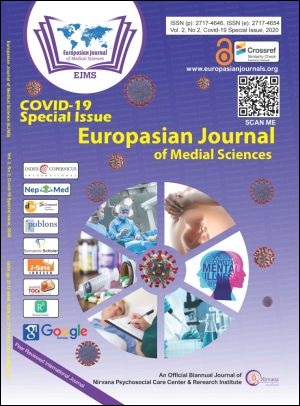Mental Health Concern during COVID-19 Pandemic in Nepal
Keywords:
COVID-19, Mental Health, SARS-CoV-2, Novel coronavirus 2019, Psychological distressAbstract
The whole world is struggling to combat COVID-19 pandemic forcing nations to take extreme measures in an attempt to prevent outbreaks and save lives. It has been noted that COVID-19 has established itself as a risk factor for psychological distress among the population of different subgroups. There are several factors such as uncertainties, controversies, misinformation, social isolation, stigma, and discrimination which are escalating the risk of massive mental distress among the public. Nepal is trying to increase its effort to combat COVID-19 by adopting community containment measures, but the mental health of the frontline health workforce, service providers, and the general public seems to be highly overshadowed. In this aspect, this paper aims to shed light on different aspects of mental health issues emerging in Nepal during the time of COVID-19 lockdown, along with some of its potential contributing factors. Nepal lacks adequate infrastructure and human resource to provide mental healthcare services effectively in case of any massive mental distress. In this state of resource deprivation, providing education and training regarding psychosocial issues to health system leaders, first responders, and health care professionals could be a key to address the population need at present and to prevent further complications.
Downloads
Downloads
Published
How to Cite
Issue
Section
License
Copyright (c) 2020 Anisha Chalise

This work is licensed under a Creative Commons Attribution 4.0 International License.
The author(s) retain the ownership of the copyrights for their work published in EJMS without any restrictions. Upon submission, the author(s) grants EJMS a license to publish, including to display, store, copy, and reuse the published content.
License to Publish
By submitting a manuscript to EJMS, the author(s) grant the journal a non-exclusive license to:
- Publish and distribute the content in all formats, media, and platforms (both existing and future), while identifying EJMS as the original publisher.
- Reproduce, display, and store the content in both print and online formats, including institutional and digital repositories.
- Translate, adapt, and summarize the work, including reprints, extracts, and abstracts.
- Develop derivative works based on the original content.
- Include the work in electronic databases and provide links to third-party materials.
Creative Commons Licensing
In addition to EJMS’s publishing rights, authors grant third parties the right to use, share, and distribute their work under the Creative Commons Attribution 4.0 (CC BY 4.0) International License. This allows unrestricted use of the content, provided proper attribution is given to the original author(s) and the journal.

